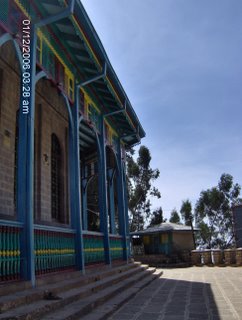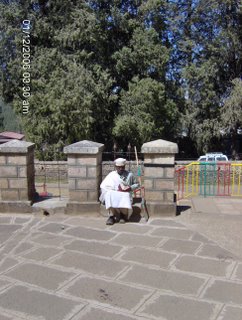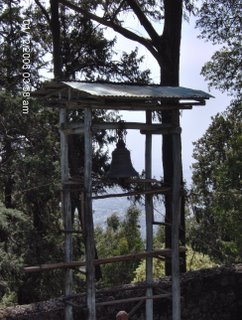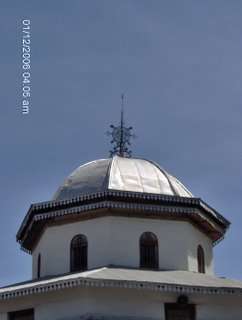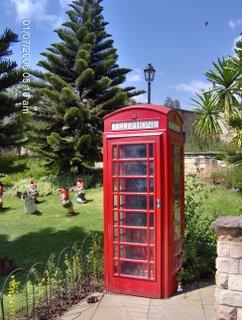No, wait -- let me step back for a moment to refrain from generalization. Had I observed the legislative process without also seeing it achieve my objectives, I would hardly say "it works!"
But I'm getting ahead of myself. Let me start from the beginning.
Today the Senate Privileges and Elections Committee's Subcommittee on Campaigns and Elections met to consider several bills: S.B. 122, S.B. 150, S.B. 272, S.B. 424, S.B. 436, S.B. 607, S.B. 627, and S.B. 628.
There are four members of the subcommittee: Republicans Jay O'Brien (chairman) and Mark Obenshain, and Democrats Creigh Deeds and Phil Puckett.
The first bill to be considered by the subcommittee, S.B. 122, is a bill that was introduced by Senator O'Brien on behalf of Fairfax County. Its primary provision would bring the employees of General Registrars under civil service protection. After meeting with several local election officials, O'Brien agreed to carry over the bill until next year, so that some wrinkles can be ironed out. This is a bill that has caused a great deal of concern among registrars. As O'Brien put it, "I've heard from a lot of registrars, and not all the comments have been flattering."
State Senator Jeannemarie Devolites Davis was in attendance to present two bills she has patroned. Her first bill, S.B. 436, deals with campaign finance law; a similar bill, S.B. 628, was patroned by Senator Deeds and the two bills were rolled together for consideration by the subcommittee.
The purpose of the two bills was to address the role of out-of-state 527 organizations that give money to Virginia candidates and political committees. Davis and Deeds were both seeking to bring these organizations under the purview of Virginia campaign finance regulations. Chris Piper, the campaign-finance-law guru for the State Board of Elections, explained to me prior to the meeting that the easiest way to understand the impact of the proposed law is that, if a 527 does 75% of its "business" in Virginia, it will have to file as a political committee under Virginia law, regardless of whether it gives money to candidates, other political committees (including state party committees or political action committees), or referendum committees.
Senator Davis wanted to make a few adjustments to the bill, so the subcommittee agreed to pass it by for a week. She and Deeds will get together to agree on the language they want to insert, and the subcommittee will look at it again next Monday, the last time it meets to consider Senate-generated bills.
The next three bills were what brought me to the meeting today, all of them dealing with the recommendations of the Hugo Commission (formally known as the General Assembly's Joint Subcommittee to Study the Certification, Performance, and Deployment of Voting Equipment) in regard to my favorite topic: VVPAT, or voter-verifiable paper audit trails.
S.B. 424 (Devolites Davis) and S.B. 150 (Deeds) both aimed to mandate that all Virginia localities using DREs (direct recording electronic voting machines) adopt some form of VVPAT. S.B. 272 (patroned by Arlington Senator Mary Margaret Whipple) instead calls for the State Board of Elections to put together a pilot program to test the various types of equipment before deciding whether to make it a universal requirement.
Davis' bill, S.B. 424, has a number of problems, in part because it overreaches. For instance, the bill proposes this in regard to electronic pollbooks, which are not yet in use in Virginia but which are widely anticipated to be implemented within the next few years:
If the pollbook is provided in electronic form, it shall provide a paper copy record of the names of the voters and their associated identifying information on a contemporaneous and continuous basis as the voters are recorded. The election officers shall verify that the name printed on the paper copy record matches the voter's name on the electronic pollbook.Now, the whole purpose of electronic pollbooks is to get rid of the paper pollbooks currently in use. This has several advantages, not least of which is the ability to include last-minute changes in the pollbook (such as the information that a registered voter has voted absentee prior to Election Day) that currently must be meticulously written in pen several days before the election and are therefore vulnerable to human error.
By requiring that the electronic pollbooks generate a paper print-out, this proposed law renders them pointless. If Senator Davis doesn't want us to use electronic pollbooks, why not just write a law that outlaws them?
But there's more. A few lines later, the bill says;
No direct recorded electronic voting machine, optical ballot tabulator, or other equipment used to enter or count votes shall have any form of wireless or power cable based electronic communication capability. Any device that is manufactured with a wireless or power cable based communication capability shall have that feature permanently and physically disabled before it may be used in any election. It shall not be sufficient to temporarily disable a wireless communication capability by a software configuration whether or not a cardkey is used to effect the disabling.Set aside, for a moment, the language about wireless communications. The real problem here is the language about "power cable based electronic communication capability." It seems, in rather obscure language, to prohibit the Hart Intercivic eSlate system used by Charlottesville and the cities of Alexandria and Falls Church, as well as some other systems used by other localities.
To their credit, both Senator Deeds and Senator Obenshain raised questions about this provision, which raised some suspicions about whether one particular voting machine vendor had asked that the language be inserted into the bill as a means to disadvantage its rivals. There's no way to prove this suspicion, of course, but when I mentioned this provision to someone who is not particularly familiar with this topic, he immediately came to this conclusion.
The subcommittee agreed that this provision was problematic and deserved clarification.
Another troublesome provision is this:
No direct recorded electronic voting machine, optical ballot tabulator, or other equipment used to enter or count votes shall be certified for use in elections unless the vendor supplies in escrow with the State Board the source code for any software used to program the particular equipment for which certification is requested. The Board shall appoint technical experts with software engineering and computer security credentials and expertise to examine the source code and report to the Board prior to certification whether the software is likely to perform correctly and has appropriate security safeguards. The Board shall ensure that the technical experts have at least 30 days for the source code review and to report their findings. The Board shall make such reports available to the public. The Board shall consider the software review reports before certifying all voting systems and shall have the authority to deny certification of systems that receive negative reviews. The Board shall also make the source code available, if requested by any state political party chairman, for review by a committee of no more than three technical experts selected by the political party.There is nothing particularly wrong with putting source code in escrow or even having it scrutinized by experts employed by the State Board of Elections. This should be part of the certification process as we seek assurances that the software is as secure and effective as the hardware it is designed to work with.
The problem comes with that last sentence, which says that political parties can appoint their own "experts" to examine the code. There is nothing that prevents the political parties from appointing someone from a competing company to review the source code of its rival. No wonder the vendors object to this provision! (A lobbyist for Hart Intercivic was present at the subcommittee meeting and brought this to the attention of the senators.)
This is where the meeting began to get contentious. The four subcommittee members went back and forth about the provisions of S.B. 424 and the similar S.B. 150, eventually agreeing to roll them together with a date of enactment of July 2009.
But they also voted to carry it over (essentially, to table it for a year) in favor of Senator Whipple's bill calling for a pilot project, which was the favored course of action by most of the people in the audience. (No one, except for Virginia Verified Voting's Alex Blakemore, who came along as Senator Davis' mouthpiece, spoke in favor of 424 and 150. Everyone else who rose to discuss it -- including myself, Norfolk Electoral Board Chairman Ed O'Neal, and Richmond General Registrar J. Kirk Showalter -- spoke against the Davis and Deeds bills and in favor of Whipple's bill, S.B. 272.)
I explained to the subcommittee that there is no demand by voters for immediate adoption of VVPAT. (I used similar arguments to what I used at the last 2005 meeting of the Hugo Commission, pointing out that, according to a survey we compiled, there were only about 26 complaints about the lack of VVPAT on or after Election Day last year.) I said that you wouldn't buy a car without taking it on a test drive, especially when the car might cost as much as $11 million.
When Davis saw the text of Whipple's bill, she complained mightily that the pilot project did not include all of the components of her own bill. And when the subcommittee voted down her bill and voted to recommend Whipple's bill, Davis was fuming. She looked like a character from a Popeye cartoon, with steam blowing out of her ears. She even said that it was a "mistake" for Virginia localities to have bought DREs in the first place, and if she had her way, she would pass a law that would require all localities to use optical-scan technology instead.
What really gored Davis' ox was that, when she and Blakemore, at separate times, made statements that were clearly untrue, the whole audience erupted spontaneously in cries of "No, no, no." This must have been embarrassing, to be caught in errors of fact on an issue pursued with such passion by the Senator.
I should point out that, during the course of the meeting, there was a lot of discussion by the subcommittee members and Senator Davis as to whether Congress is going to require some form of VVPAT in the near future. Senator Obenshain expressed the fear that we should not act too soon, because if the federal government passes a law that has different requirements, we might be caught with our pants down and have to spend millions of dollars twice within a few years. Senator Davis, who no doubt has special knowledge of what might be happening on Capitol Hill, said that she is "sure Congress will pass a requirement" and asked, "Do we want to start now or wait?"
The actuality is this: Bills in Congress to amend the Help America Vote Act (HAVA) of 2002 are non-starters. The debate about HAVA, and its implementation, were both perceived as a mess and Congress simply does not want to go through that again, and especially not so soon. There are enough diehard federalists in Congress to prevent consideration of neo-HAVA bills.
So here's the result of today's subcommittee meeting in regard to VVPAT: No statewide mandate, and a pilot program that will include Charlottesville. In fact, SBE Secretary Jean Jensen has asked that Charlottesville officials participate in the planning and design of the pilot project. We will have a place at the table from start to finish. We have been making that desire clear for at least a year now, and now we are in a position to take action.
Adopting the pilot program, as called for in Whipple's bill, makes perfect political sense. It addresses the paranoid concerns of the Virginia Verified Voting group without committing the state to a multi-million-dollar expenditure for equipment that may or may not be necessary. I have to say, when I lived in Arlington County and Senator Whipple was serving on the County Board, she and I often found ourselves at odds with each other on the issues of the day. Yet, as a member of the Hugo Commission and now in her larger role as a legislator, she has proved to be a voice of sanity when yielding to the Luddites would be the politically expedient position. She deserves our gratitude.
After all the excitement of the VVPAT bills, with Senator Devolites Davis storming out like a politician scorned, the remainder of the agenda was anticlimactic. Senators Louise Lucas and Creigh Deeds both had similar bills addressing the way recounts are conducted. The two bills, S.B. 607 and 627, were rolled together. They each would require that optical scan ballots be run through the machines again in case of a recount. This takes away some discretion from the recount court and actually returns the law to what it said prior to 2002. It eliminates a grey area and turns it into something that is clearly black or white. I don't expect this bill to be controversial as it moves through the full P&E Committee and the floor of the Senate.


